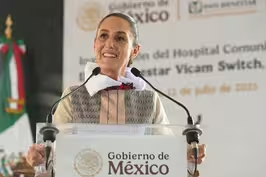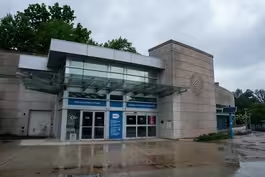
New analysis reveals FEMA missed major flood risks in Texas
Clip: 7/12/2025 | 5m 18sVideo has Closed Captions
FEMA missed major flood risks at Camp Mystic in Texas, new analysis reveals
The search for more than 100 people still missing from the catastrophic July 4 flash floods in Texas began its second week Saturday. Officials have rejected suggestions that the calamity could have been anticipated, but an analysis by NPR and PBS Frontline suggests otherwise. John Yang speaks with Laura Sullivan, an NPR investigative correspondent, to learn more.
Problems playing video? | Closed Captioning Feedback
Problems playing video? | Closed Captioning Feedback
Major corporate funding for the PBS News Hour is provided by BDO, BNSF, Consumer Cellular, American Cruise Lines, and Raymond James. Funding for the PBS NewsHour Weekend is provided by...

New analysis reveals FEMA missed major flood risks in Texas
Clip: 7/12/2025 | 5m 18sVideo has Closed Captions
The search for more than 100 people still missing from the catastrophic July 4 flash floods in Texas began its second week Saturday. Officials have rejected suggestions that the calamity could have been anticipated, but an analysis by NPR and PBS Frontline suggests otherwise. John Yang speaks with Laura Sullivan, an NPR investigative correspondent, to learn more.
Problems playing video? | Closed Captioning Feedback
How to Watch PBS News Hour
PBS News Hour is available to stream on pbs.org and the free PBS App, available on iPhone, Apple TV, Android TV, Android smartphones, Amazon Fire TV, Amazon Fire Tablet, Roku, Samsung Smart TV, and Vizio.
Providing Support for PBS.org
Learn Moreabout PBS online sponsorshipJOHN YANG: Good evening.
I'm John Yang.
The search for the more than 100 people still missing from the catastrophic Fourth of July flash floods in Texas began its second week today as the death toll has risen to at least 129.
Officials have rejected suggestions that the calamity could have been anticipated and, if not prevented, at least alleviated.
DALTON RICE, City Manager, Kerrville, Texas: This happened very quickly over a very short amount of time that could not be predicted even with the radar.
JOHN YANG: But analysis By NPR and PBS's Frontline suggests otherwise.
Laura Sullivan is an NPR investigative correspondent.
Laura, what is it that you looked at and what did you find?
LAURA SULLIVAN, Investigative Correspondent, NPR: What we found was a significantly higher risk of flooding in this camp and in this area than the federal government has ever reported.
We found that a number of the cabins were had an expectation that if a serious storm came, they were going to be inundated.
And yet FEMA's maps, what Americans depend on to know whether or not they have a flood risk, we're not showing this risk.
And so we went and looked at a number of maps that are done by private companies, you can see that if a serious storm came, that this place would be underwater, not only in the main camp, but also off into the new camp that they built recently.
And some of these are done by private companies like first street in New York, which was able to show where they expected the water.
JOHN YANG: Why the difference?
Why did these private companies pick it up and FEMA not.
LAURA SULLIVAN: FEMA does not map rainfall.
They are not mapping flash flooding.
And they're also not looking forward into what sort of climate predictions might be there coming.
FEMA is looking backward.
FEMA does not have the mandate from Congress to do this work.
And they also -- they don't have the funding to do this.
So there are wonderful scientists at FEMA that are capable of doing this.
They have some of the best data scientists in the world.
But they are not mapping this risk the way a lot of the private companies are saying.
Look, this is a serious problem.
JOHN YANG: The Associated Press had a story out this morning that said that a number of buildings at Camp Mystic had been taken off the list because you write in your investigation that there are special interests that can appeal.
How does that work?
LAURA SULLIVAN: NPR and PBS Frontline, we're also reporting this.
We have the documents that show that this camp pulled these buildings out of the floodplain.
They're saying we don't want to have these in this risky area.
So can you just take them out of your map?
And FEMA granted this request for multiple buildings back 15 years ago.
This is a significant problem because if you are in the floodplain, then you are required, if you are in a community that belongs to this program and you have a federally backed mortgage, you are required to build to a flood standard.
That usually means elevating your house so that you can survive a significant storm like this, a significant flood that's coming through.
And if you're outside the flood maps, you don't have to do that work.
And that is why a lot of communities sometimes asked to come out of it.
And even private owners like this camp requested to come out of the floodplain.
And we can see the impact that has.
JOHN YANG: To be clear, they want to get out of the floodplain on paper, but in reality, they're still in it.
LAURA SULLIVAN: Exactly.
They're still in this very dangerous area.
This is happening not just at Camp Mystic, but across the country.
More than two times as many American have a flood risk that millions of Americans don't even know they have a flood risk.
And that's because FEMA's maps have not been updated with this new information.
JOHN YANG: Because you said this is also an issue in North Carolina when Hurricane Helene moved.
LAURA SULLIVAN: Absolutely.
When were in North Carolina covering Helene, 98 percent of the people that were affected by the storm were not in FEMA's flood maps.
This means that not only if they're not in the flood map, they may not have been required to build in a way that could have helped them survive the storm, but also they may not have belonged to the National Flood Insurance Program because there wasn't a requirement for them to do so.
And so they're out of luck in that way, too.
When it comes to rebuilding, what's it.
JOHN YANG: Take to fix this legislation?
LAURA SULLIVAN: We found in our reporting that Congress needs to fund this program.
They need to fund FEMA to do these maps.
But there's a lot of pushback to having these maps updated.
A lot of politicians don't want to be the ones that will increase flood insurance rates for people across the country.
But we also found in our reporting that the National Association of Homebuilders, home developer, lobby groups, even sometimes the national association of realtors, are saying we don't want to see these maps necessarily updated because they want to keep, they say, homes affordable.
JOHN YANG: And now with FEMA in limbo under the Trump administration, changes likely, unlikely.
LAURA SULLIVAN: The cuts to FEMA are making it difficult from the insiders we've talked to do the work that they want to do.
But it is also going to undermine the agency's ability to insist on flood map changes and also insist on resilient building.
And there's a lot of feeling at this point that this administration is looking to roll back some of the requirements for how people build for a flood.
JOHN YANG: Laura Sullivan of NPR, thank you very much.
LAURA SULLIVAN: Thanks so much for having me.
Moo Deng, baby hippo who took social media by storm, turns 1
Video has Closed Captions
Clip: 7/12/2025 | 2m 45s | Moo Deng, the baby hippo who took social media by storm, turns 1 (2m 45s)
News Wrap: Trump announces 30% tariffs on Mexico and EU
Video has Closed Captions
Clip: 7/12/2025 | 2m 17s | News Wrap: Trump announces 30% tariffs on goods from Mexico and EU (2m 17s)
NIH funding cuts threaten research on sickle cell disease
Video has Closed Captions
Clip: 7/12/2025 | 5m 23s | Trump administration’s NIH funding cuts threaten research on sickle cell disease (5m 23s)
Search for justice continues for Argentina’s disappeared
Video has Closed Captions
Clip: 7/12/2025 | 7m 50s | Search for justice continues for Argentina’s disappeared, nearly 50 years later (7m 50s)
Providing Support for PBS.org
Learn Moreabout PBS online sponsorshipSupport for PBS provided by:
Major corporate funding for the PBS News Hour is provided by BDO, BNSF, Consumer Cellular, American Cruise Lines, and Raymond James. Funding for the PBS NewsHour Weekend is provided by...















